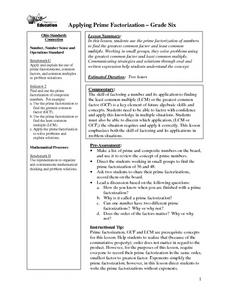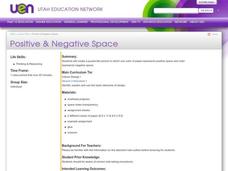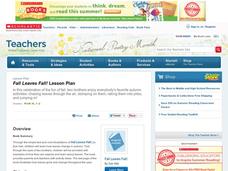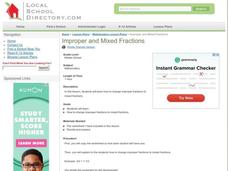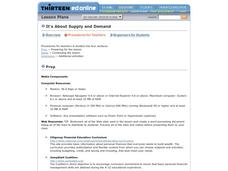Curated OER
Daily Life in the Fur Trade: Communications & Resourcefulness
Student complete a number of activities using computer based resources and primary sources to research the fur trade. They answer questions using the computer research.
Curated OER
Applying Prime Factorization
Sixth graders use the prime factorization of numbers to find the greatest common factor and least common multiple. Working in small groups, they solve problems using the greatest common factor and least common multiple.
Curated OER
Arrange the Classroom (Part 1 of 3)
Fifth graders arrange the classroom using all the moveable objects and through the exploration of area and perimeter. They determine the area of the classroom, create and label model pieces of furniture using graph paper, and create a...
Curated OER
Understanding Place Values
Students use the study sheet in the lesson to examine the different place values discussing examples on the board. They then complete the problems on the worksheet independently.
Curated OER
Simplifying Fractions
Students receive instruction on how to simply fractions by using the examples provided. They then begin working independently on the worksheet to practice simplifying fractions.
Curated OER
Writing Decimals in Word Form
Students observe an example on the board to examine what to do on their worksheet. They pass out the worksheets and work on them independently to practice their skills of writing decimals in word form.
Curated OER
Let the Matrix Do It
Learners create a matrix of the vertices of a triangle and produce new matrices that dilate, translate, rotate, and reflect the original triangle. After multiplying each matrix by a new scale factor, they graph the new matrix and...
Curated OER
Positive & Negative Space
Young scholars review and differentiate between positive and negative space, view teacher sample, and cut out shapes to create puzzle-like picture in which one color of paper represents positive space and one color represents negative...
Curated OER
Picnic Possibilities
Fourth graders plan a picnic using weather data. Using accumulated weather data from various sources, they create a graph of the weather conditions in their region for a given period of time. Students interpret this data to predict the...
Curated OER
Geometry: Practical Applications of the Distance Formula
Students, working independently and in groups, apply the distance formula to practical situations. After solving various problems, students in pairs design coordinate planes from the school blue print to measure the distance from the...
Curated OER
Making Arrays
In this making arrays worksheet, pupils, working with a partner, study and calculate how to make arrays by completing six exercises.
Curated OER
Building Storm Shelters
Sixth graders explore area and perimeter. In this online interactive area and perimeter lesson, 6th graders investigate why the perimeter of rectangles can vary considerably even when the area is held constant. Students construct...
Curated OER
Fall Leaves Fall! Lesson Plan
Students discover facts about leaves. In this early childhood lesson plan, students identify different types of leaves, and make predictions about which types of leaves they think they will find in their community. Students collect...
Curated OER
Canada's Climate: Temperature and Rainfall Variations
Middle schoolers analyze data about various climates in Canada. In this data analysis and climate lesson, students use Canada Year Book 1999 to complete a worksheet and make connections between precipitation and temperature in different...
Curated OER
The Legend of the Poinsettia
Students explore the poinsettia and its symbolism as a Christmas flower. Students will listen to a story about the poinsettia and its origins in Mexico and discuss what they know about Mexico. They will discuss the poinsettia's...
Curated OER
Finding Factors
Students explore the concept of factoring numbers. In this factoring lesson, students factor numbers. Students create a list of factors for each number.
Curated OER
Finding Identical Numbers - Standard Form
Students explore the concept of recognizing identical numbers in different forms. In this recognizing identical numbers instructional activity, students recognize identical numbers in word form and number form.
Curated OER
Identifying Fractions
Students explore the concept of identifying proper, improper, and mixed fractions. In this identifying fractions lesson, students identify if a fraction is improper, proper, or mixed.
Curated OER
Improper and Mixed Fractions
Learners explore the concept of converting improper fractions into mixed fractions. In this conversion lesson plan, students convert improper fractions to mixed fractions.
Curated OER
Writing Numbers in Decimal Form
Students explore the concept of writing numbers in decimal form. For this writing numbers in decimal form lesson, students convert a number in word form to decimal form.
Curated OER
Pay Credit When Credit is Due
High schoolers explore the concept of credit. In this credit lesson, students examine student organizers that focus on credit scores and credit history. High schoolers participate in an on-line activity. Students examine credit card...
Curated OER
IT IS ABOUT SUPPLY AND DEMAND.
Students learn that the price of an item is defined by its supply and demand. For this lesson students graph the relationship between demand and supply of various products, students also consider hidden costs.
Curated OER
Polyhedra: Faces, Edges, and Vertices (3-D Marshmallow Models)
Third graders explore the attributes of 3-dimensional shapes. In this shapes lesson, 3rd graders examine faces, edges, and vertices of 3-dimensional shapes as they construct shapes using marshmallows and toothpicks.
Curated OER
Television: Comedy Vs. Drama
Students investigate the world of Television by contrasting specific programs. In this visual storytelling lesson, students compare and contrast the differences between comedy and drama by making a Venn Diagram. Students...

